WMG News
Introducing CAD to Coventry children
The WMG Outreach team, funded by the lmagineering Foundation, has delivered a special CAD and 3D printing programme to more than 200, ten and 11 year olds across Coventry and Warwickshire.
Four University of Warwick undergraduate engineering students delivered the programme, throughout 2019, in a series of workshops designed to raise awareness and knowledge of CAD and 3D printing.
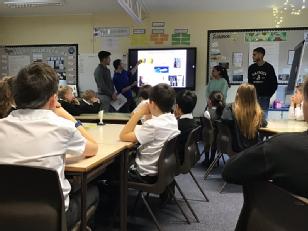 Workshop 1: Introduction to the programme and learning about 3D printing
Workshop 1: Introduction to the programme and learning about 3D printing
In the first session the team explained the role of engineers in the design process. The children were also shown how 3D printers are used to create prototypes.
Ice lollies!
In small groups the children were tasked with designing, (using CAD), and creating, (using 3D printing), an ice-lolly drip tray. During the design process the Outreach Team explained the importance of taking accurate measurements to ensure that the designs would actually work.
The challenge
Using a hairdryer (to create the feel of a warm summer’s day!) the children were presented with the problem of dripping lollies! The challenge to design a suitable drip tray was then set.
The children used life-sized 3D printed ice lollies on sticks to take key measurements needed for their drip tray designs. The pupils discussed and sketched design ideas including adding key measurements. These measurement and design sheets were then used in the next two workshops to help develop their CAD designs.
Workshop 2: Using Tinkercad to draw lolly drip tray designs in CAD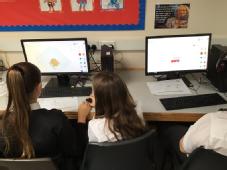
A video tutorial was used to show the children how to use Tinkercad. Building on their design work from Workshop One, the children began producing CAD drawings for the drip trays.
Workshop 3: Using scaled digital lolly model to assess and improve designs
Pupils put the finishing touches to their designs and used the scaled digital lolly models to visualise and assess their designs, considering any design modifications that were needed to ensure the drip tray was effective. The children were encouraged to continue this process until they were confident the design would work.
Towards the end of the workshop, the class shared their finished designs. The class then voted for their favourite two, these were then 3D printed and returned to the school as a momentum.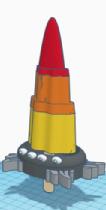
Diane Burton, Project Officer STEM Outreach explained: “The school pupils had fun learning key design principles, and they have successfully produced products that are both functional and creative.”
You can find out more about all of WMG’s Outreach activities here.
Inspiring the next generation of apprentices
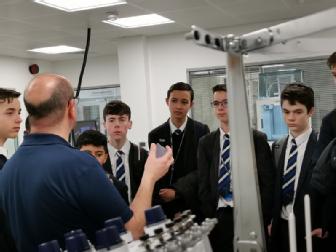 This week, as part of National Apprenticeship Week 2020, WMG welcomed 38 local students and staff to a Degree Apprenticeship Insight Day.
This week, as part of National Apprenticeship Week 2020, WMG welcomed 38 local students and staff to a Degree Apprenticeship Insight Day.
The primary focus of the day was to help students learn more about Degree Apprenticeships and explore digital health, technology and engineering career paths.
The event included a range of practical workshops and demos including engine stripping in WMG’s engineering hall, an introduction to programming and electric circuits as well as finding out about airflow over an aeroplane using a wind tunnel. Existing apprentices also gave a short talk on their apprenticeship journey and some of the exciting projects they are working on.
Rebecca Archer, Business Engagement and Student Destinations Manager, at the WMG Academy for Young Engineers Solihull, said:
“An excellent and insightful event to give a fantastic introduction to Degree Apprenticeships in the digital health, technology and engineering sectors.”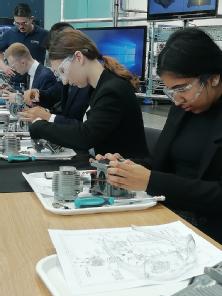
Steve Maggs, WMG’s Director of Undergraduate Programmes added:
“I’d encourage teachers, parents and students to attend more Degree Apprenticeship events to understand what engineering, technology and healthcare careers are available, and research how diverse, varied and stimulating studying and working in these area can be.”
WMG will be hosting further events of this kind to raise awareness of STEM career paths and Degree Apprenticeship programmes.
Autonomous pods SWARM together like bees in world first demonstration
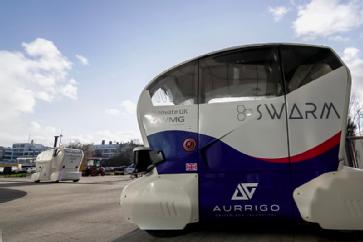 Autonomous pods born in Coventry are now able to swarm together in a world first, thanks to research by WMG at the University of Warwick in partnership with Aurrigo and Milton Keynes council.
Autonomous pods born in Coventry are now able to swarm together in a world first, thanks to research by WMG at the University of Warwick in partnership with Aurrigo and Milton Keynes council.
With the concept of driverless pods now more realistic than futuristic, the vehicles are one step closer to being put to use, as they can now help each other to drive and navigate through pedestrian areas around people.
The concept of Swarming pods was well received by the public, with the ultimate idea of using an app to hail a pod, or a platoon of pods if travelling in a group, seen as the next evolution of personal and public transport.
The pods are designed for pedestrian areas and shared spaces, so public transport can be used on highways and the pods can be used as a “first and last mile service”.
Researchers at WMG integrated Swarm intelligence into the Pods by implementing swarming skills typically used by birds and insects.
The success of ‘swarming’ means that Pods can now schedule themselves to form a ‘platoon’, following each other when possible, to minimise the number of individual vehicle movements and the need for a supervisor per pod. In the future, it’s expected that a supervisor can watch several pods and report any unexpected behaviour.
The technology also enables the Pods, working within a fleet, to automatically optimise their behaviour to meet future passenger demand by distributing themselves within a city to the areas where they will most likely be requested.
Dr Roger Woodman, Associate Professor in human factors at WMG at the University of Warwick said: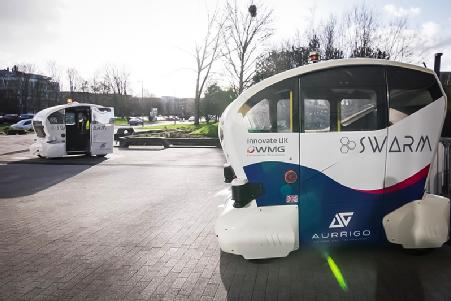
“The SWARM algorithm has been tested and is proven to be effective and reliable. The ability to make pods ‘swarm’ together like a group of bees or birds, means they can coordinate with each other, bringing them one step closer to our streets.”
Simon Brewerton, Chief Technology Officer at Aurrigo, continued:
“The collaborative SWARM algorithms have been developed to enable our autonomous vehicles to optimise their own trip schedules, so they deliver the optimum efficiency from a fleet of vehicles.
“The swarming technology is very exciting and has the potential to operate large fleets of remotely supervised autonomous vehicles in a safe and scalable way. Interest in this will be huge.”
ENDS
30 JANUARY 2020
NOTES TO EDITORS
About WMG, University of Warwick
WMG is a world leading research and education group, transforming organisations and driving innovation through a unique combination of collaborative research and development, and pioneering education programmes.
As an international role model for successful partnerships between academia and the private and public sectors, WMG develops advancements nationally and globally, in applied science, technology and engineering, to deliver real impact to economic growth, society and the environment.
WMG’s education programmes focus on lifelong learning of the brightest talent, from the WMG Academies for Young Engineers, degree apprenticeships, undergraduate and postgraduate, through to professional programmes.
An academic department of the University of Warwick, and a centre for the HVM Catapult, WMG was founded by the late Professor Lord Kumar Bhattacharyya in 1980 to help reinvigorate UK manufacturing and improve competitiveness through innovation and skills development.
About Aurrigo
Aurrigo, which created ten new jobs over the last twelve months, has seen demand for its driverless pods soar following the successful completion of major trials in the UK and across the world proved that its technology can deliver safe and efficient ‘first and last mile’ transport solutions.
Sales have come from customers in Australia, Canada, Finland, Singapore and the US, with the latest deal seeing one of its ‘Pod Zeros’ heading to China, a potential landmark moment for the Coventry-based business.
This growth takes its annual sales up to £4.2m and, with a strong pipeline of future orders in place, the company is predicting a further £6m of contracts between now and the end of 2020.
High-res images available credit to WMG, University of Warwick at: https://warwick.ac.uk/services/communications/medialibrary/images/january2020/xt2a0013.jpg
https://warwick.ac.uk/services/communications/medialibrary/images/january2020/xt2a0014.jpg
https://warwick.ac.uk/services/communications/medialibrary/images/january2020/xt2a0015.jpg
https://warwick.ac.uk/services/communications/medialibrary/images/january2020/xt2a0017.jpg
https://warwick.ac.uk/services/communications/medialibrary/images/january2020/xt2a0020.jpg
https://warwick.ac.uk/services/communications/medialibrary/images/january2020/18-srf07592.jpg
https://warwick.ac.uk/services/communications/medialibrary/images/january2020/20-srf07600.jpg
https://warwick.ac.uk/services/communications/medialibrary/images/january2020/21-srf07602.jpg
FOR FURTHER INFORMATION PLEASE CONTACT:
Alice Scott
Media Relations Manager – Science
University of Warwick
Tel: +44 (0) 2476 574 255 or +44 (0) 7920 531 221
E-mail: alice.j.scott@warwick.ac.uk
Professor Maple presents at key biometric technologies event
 Professor Carsten Maple will be presenting at the Facial Recognition and Biometrics - Technology and Ethics conference at the Royal Society on Wednesday (29 January).
Professor Carsten Maple will be presenting at the Facial Recognition and Biometrics - Technology and Ethics conference at the Royal Society on Wednesday (29 January).
The conference organised by the Foundation for Science and Technology and the Ada Lovelace Institute will be chaired by Lord Willetts.
Professor Maple joins an inspiring line-up of speakers including Elizabeth Denham CBE, UK Information Commissioner, Matthew Ryder QC, Matrix Chambers and Carly Kind, Director, Ada Lovelace Institute, to present to guests from parliament, industry and the research community.
Facial recognition, and other forms of biometric technologies, are being rapidly developed, and deployed by both the public and private sectors. These technologies promise significant benefits for individuals and institutions, but may also be increasing used in policing and forensics. Questions arise about standards, ethics, privacy, and public acceptability of these technologies across different potential applications.
Find more information and register to attend here.
It's graduation time!
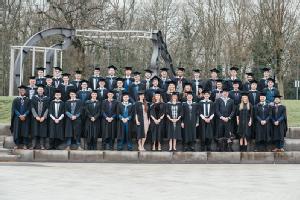 Congratulations to all our brilliant WMG students who graduated at the University of Warwick’s Winter Ceremony this week, held in Butterworth Hall.
Congratulations to all our brilliant WMG students who graduated at the University of Warwick’s Winter Ceremony this week, held in Butterworth Hall.
Alumna speaker for both ceremonies was Zoe Chilton who graduated from WMG in 2012 with an MSc in Engineering Business Management.
This year a total of 1,440 Master’s, Postgraduate Research and Undergraduate students graduated from across WMG.
There were 1,347 Master’s students and a further 19 graduated from the Postgraduate Research programme including 5 EngD, 13 PhD and one Master’s by Research students.
The final 74 were from Jaguar Land Rover, Network Rail IAC and TRW studying on WMG’s Applied Engineering Programme (AEP).
Professor Dave Mullins, WMG said: "Our graduation ceremonies are one of the highlights of our year as our new graduates celebrate their success in the company of their family and friends and prepare to apply the skills and knowledge they have gained in the career that they pursue."
WMG named as partner in three pioneering cybersecurity projects
As a result of the Cybersecurity Feasibility Studies competition WMG has been named as a partner in three key government-funded cybersecurity projects.
The Competition was launched in August 2019 and called for the automotive industry to submit their ideas on how to create a robust cybersecurity solution to support the mainstream rollout of CAVs across the UK and ensure a solution that both addresses and informs the expectations of significant emerging cybersecurity industry standards. It has been spearheaded by government-led entities including Zenzic, Centre for Connected and Autonomous Vehicles (CCAV), Department for Business, Energy and Industrial Strategy (BEIS) and Department for Transport (DfT). Some £2million will now be invested in the seven separate projects.
WMG at the University of Warwick will be part of the project consortiums for ResiCAV, BearCAT and PNT Cyber Resilience.
ResiCAV looks at how the mobility industry will detect, understand and respond to emerging cybersecurity threats in real-time.
The ResiCAV consortium will receive a grant to help CAVs develop real-time responsiveness to cybersecurity threats. The consortium will set out the requirements and specifications for Vehicle Security Operations Centres (VSOCs) that support the monitoring demands of the forthcoming ISO/SAE 21434, plus extend the application of artificial intelligence and data visualisation techniques. Finally, ResiCAV will deliver the requirements for a UK road transport Cybersecurity Centre of Excellence to support the UK’s position of meeting the global challenge of automotive cybersecurity head on.
Combining cross-sector expertise, it will be delivered by a consortium led by HORIBA MIRA, Thales and BT, with further support from WMG at the University of Warwick, the Centre for Modelling & Simulation (CFMS), Oxfordshire County Council, AESIN Techworks, plus the University of South Wales, the University of Bristol, Coventry University and the National Digital Exploitation Centre (NDEC).
 Professor Carsten Maple said: "We are delighted to be the academic partner in the ResiCAV consortium. The project will make a real difference to ensuring the cyber resilience of connected and autonomous vehicles both in engineering and operation. We will bring our academic rigour to the project, helping to formalise the methodology, and developing the requirements and advancing the technology in machine learning to support monitoring of vehicles in operation."
Professor Carsten Maple said: "We are delighted to be the academic partner in the ResiCAV consortium. The project will make a real difference to ensuring the cyber resilience of connected and autonomous vehicles both in engineering and operation. We will bring our academic rigour to the project, helping to formalise the methodology, and developing the requirements and advancing the technology in machine learning to support monitoring of vehicles in operation."
BeARCAT
"BeARCAT brings together a strong consortium of WMG, Telefonica, Millbrook and the lead, Cisco. The project will investigate the feasibility of a coherent, holistic approach to cybersecurity testing for connected vehicle networks. Our main contribution to this work will be the development of a Security Assessment Framework for the testing of connected vehicles, taking advantage of our vast experience and knowledge acquired over a number of recent projects in the area," explains Professor Maple.
PNT Cyber Resilience
For PNT Cyber Resilience WMG researchers, led by Dr Matthew Higgins, Professor Paul Jennings and Professor Tim Watson, will be working alongside Spirent Communications investigating positioning, navigation, and timing (PNT) products and services to demonstrate and determine the feasibility of a new observer-based technique to 'attack' and test CAV PNT-related functions in both controlled and real-world scenarios.
Find more information about WMG’s Intelligent Vehicles research here.
Used Nissan LEAF batteries given “second life” thanks to WMG, University of Warwick
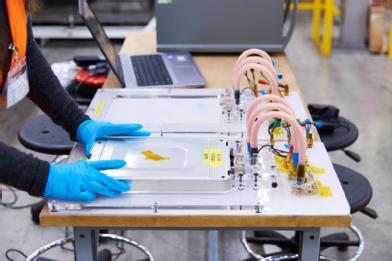 The ability to reuse high numbers of Electric Vehicle Lithium Ion batteries for domestic and industrial use is becoming a reality for Nissan thanks to a new grading system developed by researchers at WMG, University of Warwick.
The ability to reuse high numbers of Electric Vehicle Lithium Ion batteries for domestic and industrial use is becoming a reality for Nissan thanks to a new grading system developed by researchers at WMG, University of Warwick.
Once EV batteries have fulfilled their life-span for automotive applications, they are usually recycled by the manufacturer. However many automotive Lithium-ion (Li-ion) batteries have enough life left in them after the car is scrapped for ‘second-life’ uses both domestically and industrially.
To do this, it is necessary to “grade” the used batteries – identifying those suitable for use as spare parts, those suitable for “second life”, and those suitable for recycling of materials. This grading process is traditionally a long and expensive process.
Car company Nissan were keen to explore ways to make a much faster grading process for their used Li-ion batteries from the Nissan LEAF – allowing re-use of old battery packs or modules instead of disposing or recycling them.
They were challenged to demonstrate 1MWh of energy storage by the end of 2019.
Part-funded by BEIS (Business, Energy and Industrial Strategy) the ‘UK Energy Storage Laboratory’ project was launched, where 50 Nissan LEAF batteries were used to develop the existing grading process led by Nissan, WMG at the University of Warwick, AMETEK and Element Energy.
WMG’s battery technology experts in the Energy Innovation Centre developed a safe, robust and fast methodology for used automotive Lithium-ion batteries, at pack level. This methodology, which was initially developed in WMG, was successfully transferred to a pilot second-life facility, where the target of 1MWh of second-life energy storage was achieved.
In addition, the team at WMG developed ways of grading modules – the sub-components of battery packs in as little as 3 minutes – a process which previously took over 3 hours.
Graded second-life battery packs can provide reliable and convenient energy storage options to a range of customers: from electric roaming products – providing electricity for customers on the move, to home storage products – enabling customers with solar panels to store their energy generated. More crucially, the packs can be used for storage allowing increased intermittent renewable energy sources on the grid, without putting security of supply at risk.
Professor David Greenwood from WMG, University of Warwick comments:
“Automotive batteries deliver some great environmental benefits, but they consume a lot of resources in doing so. Opening up a second life for batteries improves both the environmental and the economic value we draw from those resources before they need recycling. I’m delighted that by working with the partners in this project, we’ve been able to make it much easier to access those second life applications.”
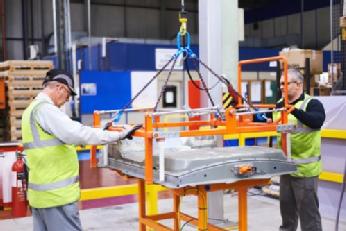 Business and Climate Change Minister, Lord Ian Duncan, said:
Business and Climate Change Minister, Lord Ian Duncan, said:
“It’s great to hear that the University of Warwick and Nissan are collaborating in pursuit of a greener, cleaner future. Reusing the batteries from electric cars could provide a valuable contribution to the UK’s green revolution - helping us lead more efficient and smarter lives as we end our contribution to climate change by 2050.
“We’ve part-funded this project to help give manufacturers more options than recycling – meaning a battery that helped a driver get from A to B could then be used to help store energy used to power a home.”
Ametek developed specialist equipment, and worked with WMG to embed the algorithms developed into a robust and industrialised machine that can be used by Nissan and other companies to grade second life batteries.
Andrew Williams, AMETEK Advanced Measurement Technology Business Unit Manager comments:
“The algorithm was developed with assistance from AMETEK EIS analyzers. We are currently implementing the algorithm in our new family of Solartron Analytical Battery Analyzer products, including our flagship SI-9300R model, which we expect will reduce market barriers for second life applications.”
The novel process is now being trialled for grading of battery modules at the second-life pilot facility, through these two processes, Nissan hopes to be able to re-use the vast majority of packs currently assembled in EVs in Europe.
Francisco Carranza, Managing Director from Nissan Energy comments:
“The number of electric vehicle batteries reaching end-of-service is set to increase from thousands to tens of thousands per annum by 2025. These batteries typically retain significant capacity and power delivery capability, and their re-use in so-called ‘second-life’ applications has been proposed as a mean to extend the battery value chain and minimise waste by deferring recycling.”
Project managers Element Energy commented:
“Reconditioning car batteries has to become business as usual - it makes sense environmentally and commercially. This project has proven a scalable process to deploy reconditioning and represents a significant milestone in the UK pathway to net zero emissions.”
For more information on this project, please see the UKESL Public Report at: http://www.element-energy.co.uk/wordpress/wp-content/uploads/2020/01/UKESL-Non-technical-Public-Report_2020.pdf
ENDS
21 JANUARY 2020
NOTES TO EDITORS
High-res images available credit to the University of Warwick at:
https://warwick.ac.uk/services/communications/medialibrary/images/january2020/university_of_warwick_and_nissan_011.jpg
Caption: Two engineers with a battery pack at WMG, University of Warwick
https://warwick.ac.uk/services/communications/medialibrary/images/january2020/university_of_warwick_and_nissan_029.jpg
Caption: A battery pack in the lab
https://warwick.ac.uk/services/communications/medialibrary/images/january2020/university_of_warwick_and_nissan_033.jpg
Caption: From left to right: Dr John Harper Senior Development Manager – Ametek, Priya Raju Project Support Officer – WMG University of Warwick, Djovana Dantas Manzi Head Of Operations at Nissan Energy Service (Europe), Dr Maria Tsiamtsouri Research Fellow at WMG Univeristy of Warwick, and Dr Jonathan Sansom Lead Engineer WMG University of Warwick.
https://warwick.ac.uk/services/communications/medialibrary/images/january2020/university_of_warwick_and_nissan_055.jpg
Caption: From left to right: Dr Maria Tsiamtsouri Research Fellow at WMG Univeristy of Warwick, Djovana Dantas Manzi Head Of Operations at Nissan Energy Service (Europe), Dr Jonathan Sansom Lead Engineer WMG University of Warwick and Priya Raju Project Support Officer – WMG University of Warwick.
https://warwick.ac.uk/services/communications/medialibrary/images/january2020/university_of_warwick_and_nissan_058.jpg
Caption: From left to right: Dr John Harper Senior Development Manager – Ametek, Djovana Dantas Manzi Head Of Operations at Nissan Energy Service (Europe) and Dr Jonathan Sansom Lead Engineer WMG University of Warwick.
For further information please contact:
Alice Scott
Media Relations Manager – Science
University of Warwick
Tel: +44 (0) 2476 574 255 or +44 (0) 7920 531 221
E-mail: alice.j.scott@warwick.ac.uk
WMG appoints Professor of Complex Programme Management
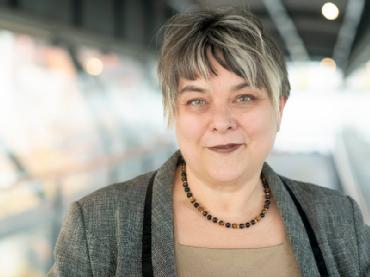 WMG is delighted to welcome Naomi Brookes as its first Professor of Complex Programme Management.
WMG is delighted to welcome Naomi Brookes as its first Professor of Complex Programme Management.
Naomi brings a wealth of expertise in project and programme management to WMG. She began her career in the aerospace industry with Rolls-Royce plc. Since then she has worked in academia in both business and engineering faculties (where she has held a prestigious Royal Academy of Engineering professorship) and has founded her own consultancy practice.
She has authored over 130 peer-reviewed journal papers, book chapters and articles in project and innovation management and has conducted research projects funded by a wide variety of organisations including the UK Research Councils and the European Science foundation. Naomi's work has been used by organisations such as the OECD, the European Commission, the European Investment Bank and the World Economic Forum, and she has been an invited to speaker by organisations as diverse as Dubai’s International Project Management Forum and the Chinese Academy of Engineering.
Most recently Naomi has chaired the MEGAPROJECT network, an EU funded initiative bringing together over 90 researchers from 25 countries promoting learning across large infrastructure projects. She has also worked on reducing the UK’s annual spend of over £3bn on its nuclear decommissioning programme.
Naomi has been recruited to WMG to develop a brand new research capability to complement its existing expertise in Project and Programme Management taught programmes. At WMG, Naomi will be developing her work on complex performance to identify ways to make projects and programmes more sustainable, more responsible and more cost-effective.
WMG PhD student attends prestigious Global Young Scientists Summit
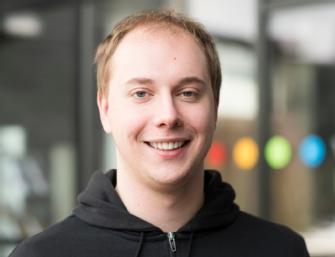 WMG PhD student Chris Ellingford has been selected to attend the 8th Global Young Scientists Summit (GYSS) in Singapore from 14 to 17 January 2020.
WMG PhD student Chris Ellingford has been selected to attend the 8th Global Young Scientists Summit (GYSS) in Singapore from 14 to 17 January 2020.
Chris was one of only 300 participants, from across the world, and one of only five from the University of Warwick invited to attend.
GYSS gathers young researchers and scientists from across the world to encourage them to pursue their scientific ambitions. They have the chance to network with peers, as well as distinguished scientists and researchers.
The theme for this year’s event is "Advancing Science, Creating Technologies for a Better World,” with an impressive line-up of speakers including recipients of the Nobel Prize, Fields Medal, Millennium Technology Prize and Turing Award.
At GYSS Chris, as one of only 100 participants selected, will present at the poster session, and take part in lectures and panel discussions, and have the opportunity to interact with speakers in informal small group sessions. Outside of the Summit, Chris will also have the chance to visit local universities and research centres to learn more about Singapore’s research and innovation ecosystem.
Chris is currently in the 4th year of his Research Degree at WMG. He is based within the Nanocomposites team investigating "Self-healing Elastomeric Nanocomposites for Actuation and Energy Harvesting."
Charging ahead at Battery School
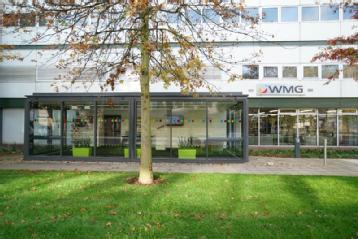 WMG is running a special three-day Battery School at its Energy Innovation Centre from 17-19 February 2020 for industry personnel.
WMG is running a special three-day Battery School at its Energy Innovation Centre from 17-19 February 2020 for industry personnel.
WMG battery experts will facilitate a mix of lectures and practical hands-on-sessions, with the intention of inspiring the next generation of engineers into battery related careers, crucial for the UK’s electrification sector.
The lectures will cover areas including manufacturing Lithium batteries, module and pack design, electrical testing and ageing, battery management systems, safety and abuse testing, forensic characterisation and battery end of life.
Meanwhile the practical lab sessions will focus on microscopy; electrode mixing and coating; pouch and cylindrical cell fabrication; cell and module testing; and forensics.
Find out more and book your place here.

